Home Tags Posts tagged with "pasok"
pasok
Greece is braced for a 48-hour general strike across public and private sectors in protest at a proposed new wave of spending cuts.
Protest marches – which regularly end in running battles with police – are planned for the centre of Athens.
The action coincides with a debate in parliament on the austerity measures, with a vote by MPs due on Wednesday.
Greece must back the measures, and the 2013 budget, to receive the next part of a bailout and avoid bankruptcy.
The latest strike starting on Tuesday includes public transport workers, lawyers, air traffic controllers, taxi drivers, journalists and hospital staff.
Some transport and media workers downed tools on Monday as well.
With proposals for a fifth consecutive cut to pensions, an increase in the retirement age and reductions to salaries, benefits and healthcare, the fury among Greece’s population is growing.
Greek ministers say the package should save a total of 13.5 billion euros ($17 billion) by 2016.
Approving the tough reforms and passing the 2013 budget are key to receiving a 31.5 billion-euro installment from the International Monetary Fund and European Union that has been on hold for months.
However, the Democratic Left Party which is the junior member of the three-party governing coalition, is refusing to back the package.
The second biggest coalition party, the socialist Pasok, is also facing a rebellion by some MPs.
Prime Minister Antonis Samaras has tried to reassure the public, who have endured repeated rounds of austerity and a five-year recession.
“These will be the last cuts in wages and pensions,” he said on Sunday.
“We promised to avert the country’s exit from the euro and this is what we are doing. We have given absolute priority to this because if we do not achieve this everything else will be meaningless.”
[youtube zBvQkBfV-78]
Talks between three Greek parties on forming a new coalition government are set to resume on Wednesday, amid intense international pressure.
New Democracy, the conservative winner of Sunday’s election, is expected to lead the new government.
Pasok leader Evangelos Venizelos said a government could be formed by midday on Wednesday.
New Democracy leader Antonis Samaras’s three-day mandate to form a government expires on Wednesday.
It is unclear whether Pasok, which came third in the vote, will join the government, or merely support it.
The third party is Democratic Left. Between them, the three parties would have a majority of 29 seats in parliament.
They all favor keeping Greece in the euro while wanting to renegotiate terms of its EU-IMF bailouts, although they differ on the extent.
However, European leaders have indicated that there is limited room for manoeuvre and are expecting details on how the new government intends to make another 11.7 billion Euros ($14.8 billion) of cuts by 2014.
New Democracy won 129 seats in Greece’s 300-seat parliament on Sunday, followed by the radical anti-bailout party, Syriza, with 71, Pasok with 33 and the Democratic Left with 17.
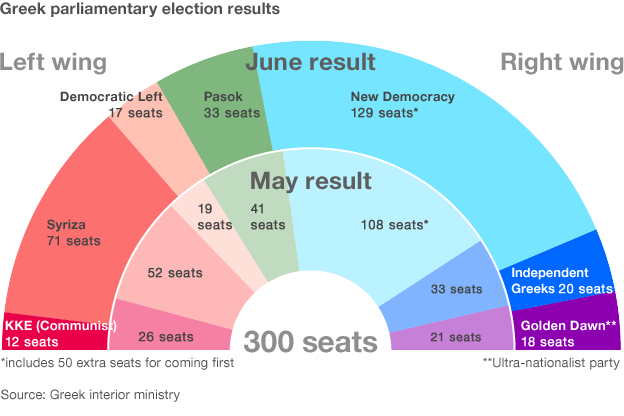
New Democracy won 129 seats in Greece's 300-seat parliament on Sunday, followed by the radical anti-bailout party, Syriza, with 71, Pasok with 33 and the Democratic Left with 17
World powers have urged Greece to move swiftly to form a government.
Speaking after talks between the three parties in parliament on Tuesday, Eavngelos Venizelos said a government “must be formed as soon as possible”.
He said his party would support the government “wholeheartedly”, but had not yet decided what form its participation would take.
If Antonis Samaras fails to form a government by the deadline on Wednesday, Syriza would be given a chance, followed by Pasok.
But Syriza leader Alexis Tsipras has said he will not even attempt to do so. He has also refused to join a government led by New Democracy.
Two international bailouts have been awarded to Greece, an initial package worth 110 billion Euros ($138 billion) in 2010, then a follow-up last year worth 130 billion Euros ($164 billion), but they come with tough austerity measures attached.
Greece has also had 107 billion Euros ($135 billion) of debt, held by private investors, written off.
Bailout deal – Greek pledges
• Cut 15,000 state sector jobs this year – aiming for 150,000 to be cut by 2015
• Cut minimum wage by 22%, to about 600 Euros a month
• Pension cut worth 300 million Euros this year
• Spending cuts of more than 3 billion Euros this year
• Liberalize labor laws to make hiring and firing easier
• Boost tax collection
• Carry out privatizations worth 15 billion Euros by 2015
• Open up more professions to competition (health, tourism and real estate)
• Greece aims to cut its debt burden to 116% of GDP by 2020
World leaders have welcomed the narrow election victory of Greece’s broadly pro-bailout New Democracy party and urged Athens to form a cabinet quickly.
The eurozone group said reforms were Greece’s “best guarantee” to overcome tough economic and social challenges.
The US stressed that it was in everyone’s interests “for Greece to remain in the euro area”.
The Syriza party, which rejected the bailout terms and came a close second, said it would lead the opposition.
With more than 99% of votes counted, interior ministry results put New Democracy on 29.7% of the vote (129 seats), Syriza on 26.9% (71) and the socialist Pasok on 12.3% (33). There are 300 seats in parliament.
Greek voters went to the polls on Sunday following May’s inconclusive elections.
New Democracy leader Antonis Samaras said Greeks had chosen to stay in the euro and called for a “national salvation government”.
Syriza’s leader Alexis Tsipras said his party would not take part in the government, and would instead become a powerful anti-austerity voice in the opposition.
The vote was watched around the world, amid fears that a Greek exit from the euro could spread contagion to other eurozone members and deepen the turmoil in the global economy.

New Democracy leader Antonis Samaras said Greeks had chosen to stay in the euro and called for a "national salvation government"
Tough austerity measures were attached to the two international bailouts awarded to Greece, an initial package worth 110 billion Euros ($138 billion) in 2010, then a follow-up last year worth 130 bn euros.
Stock markets responded positively to Sunday’s results, with share prices up in Asian trading.
In a statement on behalf of the 17 eurozone finance ministers, Luxembourg Prime Minister Jean-Paul Juncker said that “continued fiscal and structural reforms are Greece’s best guarantee to overcome the current economic and social challenges and for a more prosperous future of Greece in the euro area”.
In a joint statement, European Commission President Jose Manuel Barroso and European Council President Herman Van Rompuy also hailed the result, and expressed hope that a government would be formed quickly.
German Chancellor Angela Merkel telephoned Antonis Samaras to congratulate him on his victory.
A German government statement said she had “stated that she would work on the basis that Greece will meet its European commitments”.
Antonis Samaras said that the Greek people had voted to stay in the eurozone.
“There is no time to waste,” he said.
“A national salvation government must bring economic growth and reassure Greeks the worst is over.”
He added: “There will be no more adventures. Greece’s place in Europe will not be put in doubt,” promising that Athens would “honor its obligations.”
It appears Antonis Samaras wants to press ahead with spending cuts demanded by the country’s international creditors.
European leaders have warned that if the new Greek government rejects the bailout, the country could be forced to abandon the single currency.
New Democracy should be able to build a majority coalition with the socialist Pasok, benefiting from a rule which gives the leading party 50 extra seats in the 300-seat chamber.
However, coalition talks may not be easy.
In addition to Syriza’s showing, four other parties which oppose or want a radical overhaul of the bailout look set to take between 60 and 70 seats. They include the far-right Golden Dawn, which has about 7% of the vote.
New Democracy and Pasok have said they will keep the bailout in a renegotiated form.
The leader of Pasok, Evangelos Venizelos, proposed a broad four-party coalition including New Democracy, Pasok, the Democratic Left and Syriza.
“No decision can be taken without this national unity,” he said.
[youtube 7WBPREtams0]
Right-wing New Democracy and left-wing Syriza parties are almost neck-and-neck after Greek parliamentary elections, according to the first exit polls.
New Democracy, which broadly supports a European bailout deal, was one to two percentage points ahead of Syriza, which opposes the measure.
The outcome could decide Greece’s future inside the euro.
If the exit poll is correct, New Democracy should be able to build a majority coalition.
The government will be relatively weak, and will seek to change the terms of the bailout.
The election was the second in six weeks, called after a 6 May vote proved inconclusive.
On that occasion, each of the main parties tried but failed to form a coalition government.
New Democracy is thought to have polled between 28 and 30% of votes, with 27-28% for Syriza, one exit poll carried out jointly by five polling companies for the main TV channels showed.
An earlier version of the poll only 80% complete had the two parties virtually neck and neck, prompting fears of a hung parliament.
The latest projection would give New Democracy 127 seats, benefiting from a rule which gives the leading party 50 extra seats in the 300-seat chamber.
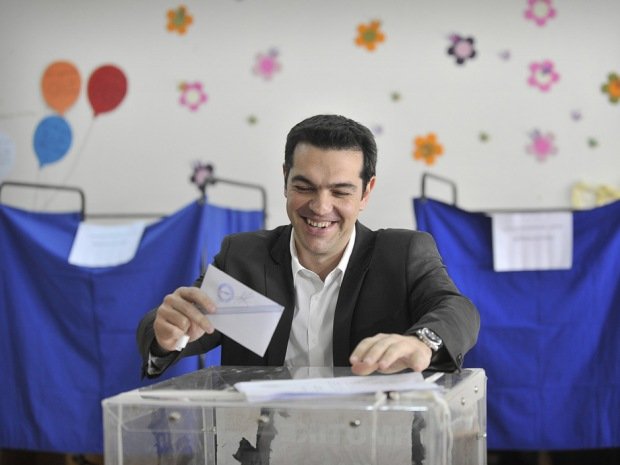
Right-wing New Democracy and left-wing Syriza parties are almost neck-and-neck after Greek parliamentary elections, according to the first exit polls
It gave the centre-left Pasok, its potential coalition partner, 32 seats, enough for a majority in the 300-seat parliament, with Syriza gaining 72 seats.
New Democracy could also invite a small left-wing party, Democratic Left, to join the coalition to reflect some of the anti-bailout feeling in the country.
With such a strong showing by Syriza, Greece could be in for an autumn of discontent by opponents of the bailout deal.
Another poll for a separate TV station gave Syriza a marginal lead.
Coalition talks will be expected to start on Monday.
Several smaller anti-bailout parties are expected to get between 13 and 21 seats.
Sunday’s vote is being watched around the world, amid fears that a Greek exit from the euro could spread contagion to other eurozone members and send turmoil throughout the global economy.
Tough austerity measures were attached to the two international bailouts awarded to Greece, an initial package worth 110 billion Euros ($138 billion) in 2010, then a follow-up last year worth 130 billion Euros.
Many Greeks are unhappy with the conditions attached to deals which have been keeping the country from bankruptcy.
Polls have shown most Greeks favor staying in the euro and all the main parties except the communist KKE say they will keep Greece in the single currency, but Syriza believes it can renegotiate the bailout deal.
New Democracy leader Antonis Samaras has warned that rejection of the bailout would lead to a return to the drachma, but correspondents say a very large number of Greeks appear to have defied this pressure.
“Greeks voted with emotion and not with reason, this is why you see these numbers,” New Democracy supporter Evangelos Datsos told Reuters news agency after the initial exit polll results came through.
But Syriza supporters were confident of victory.
There is a subdued atmosphere in the Greek capital on Sunday night, with many people just at home, watching nervously on television.
Greeks are proud and therefore private when it comes to explaining their fears to foreigners, our correspondent says, but behind closed doors they are worried about what this means for their country and their futures.
Right-wing New Democracy and left-wing Syriza parties are almost neck-and-neck after Greek parliamentary elections, according to the first exit polls.
Greece elections exit polls 75% at 19:00, local time:
New Democracy: 27.5-30.5%
Syriza: 27-30%
Pasok: 10-12%
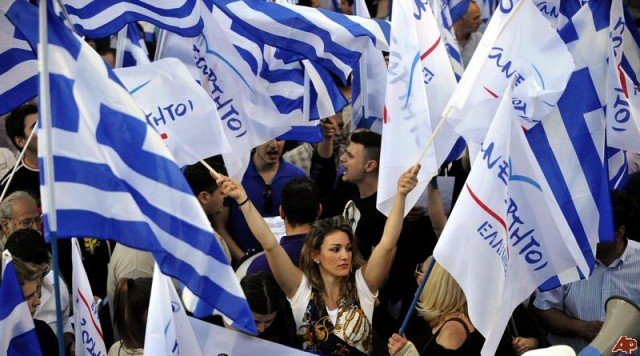
Right-wing New Democracy and left-wing Syriza parties are almost neck-and-neck after Greek parliamentary elections, according to the first exit polls
Greek elections outcomes:
If pro-austerity parties (Pasok and New Democracy) win:
• Could have best chance of re-negotiating bailout
• May say austerity measures need longer time-frame
• But may need a third party to form majority
If anti-austerity parties (Syriza and others) win:
• Syriza threatening not to honor bailout
• If so, Greece could be forced out of euro
• Reintroduction of Drachma would lead to devaluation, inflation and business failures
• But could allow economy to grow
If there is a hung parliament:
• Third round of elections needed
• More political uncertainty
• Restricted access to bailout funds
[youtube bYVFItW6dyQ]
[youtube 3jOj2Bu2uYg]
Evangelos Venizelos, leader of Greek Socialist Pasok party, has announced that the country is set to go to the polls again after days of coalition talks failed to produce agreement on a new government.
A final round of talks on Tuesday morning broke up without a deal.
In elections on 6 May, a majority of Greek voters backed parties opposed to austerity plans demanded by the EU and IMF in return for two bailouts.
Greek president Karolos Papoulias will appoint a caretaker government on Wednesday.
Karolos Papoulias will meet all political leaders at 13:00 local time on Wednesday to put in place an interim government until the new vote, which is expected to take place on 10 or 17 June.
“Unfortunately, the country is heading again toward elections,” Evangelos Venizelos told reporters after the talks on Tuesday.
The euro fell sharply on the news, tumbling from $1.2842 to $1.2771 shortly after 13:15 GMT – its lowest value since 18 January.
Greek shares also fell before recovering slightly.
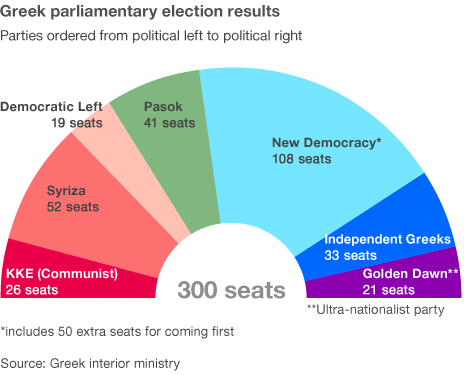
Greek parliamentary results
The leader of the right-wing Independent Greeks Party, Panos Kammenos, said: “The pro-bailout parties would prefer a government which will further torment the Greek nation, rather than finding a solution. They have offered a proposal that is too rigid for me to accept.”
European leaders say that they will cut off funding for Greece if it rejects the bailout agreed in March.
This would mean effective bankruptcy for Greece and its all but certain exit from the European single currency, analysts say.
German Finance Minister Wolfgang Schaeuble again ruled out amending the bailout agreement.
“The people in Greece must know that what we have agreed for Greece and have set in train is an entirely unusual effort,” he said after talks in Brussels on Tuesday.
Polls suggest the leftist Syriza bloc, which came second in the 6 May vote and rejects all further cutbacks, could become the largest party after a new election.
Syriza wants to renegotiate the bailout package but also wants to keep Greece in the euro.
Greece must also decide whether to redeem an outstanding bond worth 436 million Euros ($558.67 million) which matures on Tuesday.
A Greek official, speaking on condition of anonymity, told the Associated Press that Athens would pay off the debt on schedule, thereby avoiding a default.
The chairman of the eurozone group of finance minister, Jean-Claude Juncker of Luxembourg, said on Monday he wanted Greece to remain in the single currency but warned that Athens must keep to its commitments.
Pasok and New Democracy, which signed up to the bailouts and had previously dominated Greek politics for decades, saw their combined share of the vote drop from about 77% to about 33% on 6 May.
Greek moderate Democratic Left party says it will not join pro-bailout parties in a coalition without the more radical far left Syriza.
The Greek president has called the four main parties, including the centre-right New Democracy and the Socialist Pasok, to try to form an emergency government to avoid new elections.
But Syriza said it would not attend because it could not back any coalition which supported austerity.
A majority voted against last week.
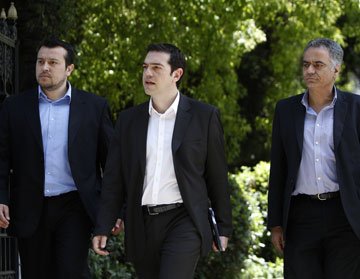
Greek moderate Democratic Left party says it will not join pro-bailout parties in a coalition without the more radical far left Syriza
EU finance ministers are due to meet in Brussels to discuss the Greek crisis later on Monday.
The fear over holding new elections is that parties that oppose austerity measures that are a condition of Greece’s bailout deal might do well again in new polls.
And with no sign Europe’s leaders are prepared to renegotiate the deal, Greece could end up leaving the eurozone.
For the first time, some central bankers have spoken openly about the consequences of a Greek exit from the single currency.






